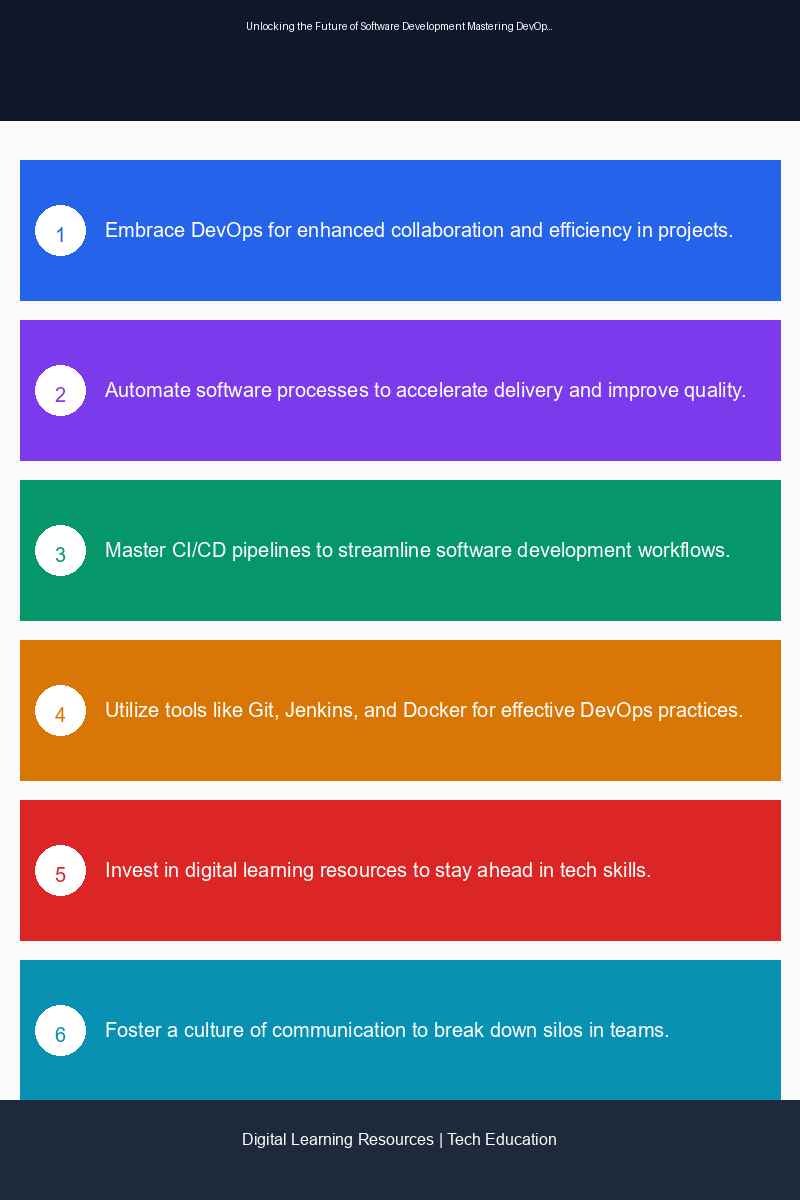Key Takeaways: This blog post explores the collaboration between development and operations teams, the automation of software processes, and the significance of continuous integration and delivery (CI/CD). We’ll also cover essential learning paths, industry trends, and actionable best practices to enhance your career prospects in the tech industry.
Introduction
In today’s fast-paced tech landscape, the integration of software development and operations—commonly referred to as DevOps—has become essential for successful project delivery. As organizations strive for speed and efficiency, the automation of software processes and the establishment of CI/CD pipelines are key components that enable teams to deliver high-quality software rapidly. This blog post serves as a comprehensive guide for developers, IT professionals, and tech learners who are eager to enhance their skills and adapt to the evolving demands of the industry.
Technical Background and Context
DevOps is more than just a methodology; it represents a cultural shift that emphasizes collaboration between development and operations teams. By breaking down silos, organizations can improve communication, reduce bottlenecks, and streamline the software development lifecycle. Key technical concepts include:
📚 Recommended Digital Learning Resources
Take your skills to the next level with these curated digital products:
AI Enhanced Resume Builder
AI Resume Builder Flask App – Complete Source Code + PDF Tutorial + HTML | Digital Download for Designers
Learn AWS: Your First Cloud Application
Learn AWS: Your First Cloud Application
📊 Key Learning Points Infographic

Visual summary of key concepts and actionable insights
Comprehensive SAT Prep: 470+ Vocabulary Words
Comprehensive SAT Prep: 470+ Vocabulary Words
Master DevOps in Practice – 50 Essential Topics for Engineers (PDF eBook)
Master DevOps in Practice – 50 Essential Topics for Engineers (PDF eBook)
The Ultimate Keyboard Shortcut Guide 49 Software Cheat Sheets in One PDF Bundle
The Ultimate Keyboard Shortcut Guide 49 Software Cheat Sheets in One PDF Bundle
- Collaboration: Teams work together to share responsibilities and enhance communication, resulting in a more cohesive workflow.
- Automation: Utilizing tools to automate building, testing, incident management, and release processes significantly reduces manual errors and increases efficiency.
- CI/CD Pipelines: Continuous Integration and Continuous Delivery pipelines facilitate the automation of code integration and deployment, allowing for frequent releases with improved quality.
Practical Applications and Use Cases
Implementing DevOps practices can yield numerous benefits across various stages of the software development lifecycle:
- Faster Time to Market: Automation allows teams to quickly build, test, and deploy code changes, enabling faster delivery of features and updates.
- Enhanced Quality Assurance: Continuous testing within CI/CD pipelines ensures that code is thoroughly vetted before deployment, reducing the likelihood of bugs in production.
- Improved Incident Management: Automated monitoring and alerting can swiftly identify and resolve issues, minimizing downtime and improving user satisfaction.
Learning Path Recommendations
To thrive in the evolving tech landscape, consider pursuing the following educational opportunities:
- DevOps Certification Programs: Obtain certifications such as AWS Certified DevOps Engineer or Certified Kubernetes Administrator to validate your skills and enhance your career prospects.
- Learning Git: Master version control with Git by exploring platforms like GitHub, GitLab, and Bitbucket, focusing on collaborative coding practices.
- Understanding Maven: Gain expertise in Maven for build automation and project management, particularly for Java-based projects.
- Training in Jenkins: Learn how to use Jenkins as an automation server to streamline CI/CD processes and manage development tasks effectively.
Industry Impact and Career Implications
The adoption of DevOps practices is transforming how organizations operate, leading to significant industry trends:
- Integration of AI, ML, and IoT: The capabilities of AI and machine learning are being integrated into DevOps to improve prediction and automation, while IoT devices demand robust DevOps practices to manage their data effectively.
- Cultural Shift: As more organizations embrace DevOps, a cultural change is occurring that prioritizes collaboration, transparency, and accountability.
- Remote Work Environments: The shift towards remote work has made it imperative for teams to adopt tools and practices that facilitate collaboration across distributed environments.
Implementation Tips and Best Practices
When implementing DevOps practices within your organization, consider the following tips:
- Start Small: Begin with a pilot project to streamline processes and gather data on improvements before scaling up.
- Invest in Training: Ensure your team is well-versed in the tools and methodologies being adopted, such as Git, Maven, and Jenkins.
- Encourage Collaboration: Foster a culture of collaboration and open communication between development and operations teams to enhance workflow and project outcomes.
- Continuous Improvement: Regularly evaluate and refine your processes, tools, and practices to adapt to changing demands and technologies.
Future Trends and Skill Requirements
As technology continues to evolve, several skills will become increasingly important in the DevOps field:
- Proficiency in Automation Tools: Familiarity with tools like Jenkins, Terraform, and Ansible will be essential for automating software development tasks.
- Security Practices: Understanding DevSecOps will be crucial as security becomes a priority within the DevOps pipeline.
- Cloud Computing Knowledge: Proficiency in cloud platforms like AWS, Azure, and Google Cloud is vital as organizations migrate to cloud-based solutions.
Conclusion with Actionable Next Steps
The future of software development lies in the seamless integration of DevOps methodologies and automation practices. By investing time in learning essential tools such as Git, Maven, and Jenkins, and pursuing relevant certifications, you can enhance your career prospects in this thriving field.
To take action:
- Enroll in a DevOps certification program to validate your skills.
- Set aside time to learn and practice Git for version control.
- Explore Maven and Jenkins through online tutorials and documentation.
- Stay updated with industry trends by following tech blogs and attending webinars.
Embrace the opportunities that DevOps offers, and position yourself for success in an ever-evolving tech landscape.
Disclaimer: The information in this article has been gathered from various reputed sources in the public domain. While we strive for accuracy, readers are advised to verify information independently and consult with professionals for specific technical implementations.
Ready to advance your tech career? Explore our digital learning resources including programming guides, certification prep materials, and productivity tools designed by industry experts.



